- Home
- Lin Carter
Zanthodon Page 5
Zanthodon Read online
Page 5
As things turned out, this did not prove to be necessary.
For the ledge which thrust out like a protruding lip was, as it were, the front stoop of a cave whose black mouth yawned aide and unblocked. There were many such caves in the face of these cliffs, and Hurok had noticed them during his ascent.
He had suspected them of being lairs of the mighty omodon, the shaggy cave bear of the Pleistocene.
And he did not wish to enter into that black, close-walled hole in the rock and find himself face-to-face with an angry omodon in the dark.
As if sensing that its luncheon was about to elude its grasp, the thakdol gave a blood-chilling screech, and came hurtling down upon the Neanderthal, hooked claws ready to seize and tear.
Abandoning all caution, Hurok whirled and flung himself into the grim stony jaws of that unexplored cavern whose mouth opened like a black portal to the unknown.
For a time, the thakdol circled about the cliff, hungrily eyeing the cave entrance, hopefully waiting to see if its lost luncheon would soon emerge.
This did not, in fact, transpire.
In time, the disgruntled reptile flew off in search of an easier and more accessible meal elsewhere. And still Hurok did not emerge from the black throat of the cave ....
Chapter 7. THE DOOR IN THE CLIFF
When the enormous leech reared up to clasp Professor Potter in its loathsome embrace, its forepart emerged from the gloom of the heavy forest into the daylight. Instantly the thing uttered a piercing squeal and fell back into the shadows again, where it flopped and writhed as if in great pain.
Now the forepart, that wriggling proboscis-like extrusion, is where are located the two rows of its six unblinking eyes. Perhaps the monstrous slug was more accustomed to the gloom of its under-earth burrows or to the depths of the wood, and thus could not without intense suffering endure the light of day.
Perhaps . . . and, while the luminous cavern "sky" of is by no means as brilliantly illuminated as are the sunlit skies of the Upper World, the peculiar phosphorescence of the cavern roof is still bright enough to inflict acute suffering on the weak and lidless eyes of such denizens of the darkness as the leech would seem to be.
At any rate, the very instant that the wriggling thing tore its gaze from the Professor, the old man was once again in full command of his faculties. Whatever form of hypnotism or mental control the thing had exerted upon the Professor to paralyze his will and to root him to the spot, the stab of pain inflicted upon the leech by its sudden exposure to the open light sufficed to break the spell which had held him rapt and helpless.
Instantly, the Professor whirled about frantically, trembling with loathing and terror, to seek a hiding place or some means to escape from the dangerous proximity of the vampiric leech.
To his amazement, there was now a door in the stone wall.
Professor Potter gasped, rubbed his eyes and stared again.
There was no doubting that where only moments before the sheer wall of the cliff had stretched smooth and unbroken, now a black, door-like aperture yawned in the smooth expanse of what he had assumed to be solid rock!
For an instant, the old scientist paused, staring dubiously into the darkness of the black doorway. But he paused for an instant only. Surely, whatever strange peril or uncanny terror might conceivably lurk within the recesses of that black opening, they could not be half so horrible as the grisly doom from which he had just escaped.
He stepped into the opening in the wall.
And darkness closed about him, absolute and unbroken by the faintest glimmer of radiance from within.
"Glorious Galileo, this is amazing!" murmured the Professor in awestruck tones. For there seemed to be little question that the aperture was the work of human hands-or, at least, the product of some form of high intelligence. The rectangular opening was cut into the solid stone with such skill that the edges of the portal were smooth and sleek.
Marveling at the curiosity, the Professor ventured a step or two farther into the dense gloom.
As he did so, his foot touched a loose stone in the floor, depressing it slightly. A distinct click sounded in the stony silence of the vault. Then there came a whirring, grating sound, as of massive gears rumbling into action, triggered, it might be, by some mechanism concealed beneath the loose stone in the floor.
And then a thick slab of stone slid down into place, blocking the entrance to the mysterious vault. So flawlessly was the stone cut that it fitted with exact precision, and from the exterior the stone wall doubtless showed no more than a hairline crack-and that only to the eye that knew exactly where to look and also what to look for.
"Incredible!" breathed the Professor. And indeed it was: for, as far as any of us knew, the highest civilization which existed here in the Underground World was that of the cave kingdom of Thandar. And the sophisticated mechanism which had opened and then closed the door to this secret place far exceeded, in its use of weights and counterweights, anything which could reasonably have been expected of a Stone Age culture.
Since he had not any means to create a light the Professor began to shuffle cautiously forward like a blind man, feeling his way through the black, stifling gloom with extended hands. To his left was a rough wall of stone which continued upward for as far as the Professor could reach. The floor underfoot was likewise rough, but seemed set with flagstones at intervals-perhaps as a guidepath through the darkness.
Step by careful step, the Professor followed this path. When there came an abrupt ending of the wall to his left, he felt about and found an intersecting corridor. Here his fumbling fingertips-reaching about to explore-discovered a peculiar contrivance set high up on the nearer wall, just at the point of intersection between the two corridors.
"My word!" breathed the Professor.
The object seemed, to the touch at least, to be a metal bracket clamped to the wall by screws or rivets.
And the bracket held an unlit torch!
It was a length of wood, pulped into shavings and intermixed with some tarry substance which held the wood pulp together like glue. The Professor took it down, ran his sensitive fingertips the length of it and held it to his nostrils for a sniff or two, in order to ascertain these facts.
The really interesting thing about his discovery was that the torch or candle, or whatever it might best be called, was fresh and new. And that the bracket, which seemed to be of iron, was greased against damp and rust.
Now it had already occurred to Professor Potter that these caverns and the weighted, swinging door in the cliff could have been the product of some long-extinct race from out of the past of . But now he held concrete evidence that the caverns within the Peaks of Peril were inhabited today-but by what race he had no way of knowing. At any rate, they commanded a technology superior to anything else he had yet seen in the Underground World.
And this was very interesting.
Fumbling in the pockets of the collection of khaki rags and tatters that was all which remained of his safari breeches, the savant produced bits of flint which he proceeded to strike together, patiently, blowing on them all the while. He hoped, obviously, to light the torch candle, and with its light to explore more easily this maze of caverns. For he had no wish to go out by the way he had come in, lest he find the hideous leech thing still waiting for him beyond the door in the wall.
It took longer than he might have wished, but at last the torch-candle caught fire and the tar-impregnated punk glowed into luminance. The light thereof was soft and muted, peculiarly so, but it burned with a steady, dim radiance. The Professor proceeded to explore . . .
I lay inwardly fuming but outwardly calm with my back against a boulder near the foot of the Peaks. My hands and arms had been bound behind my back, which made my present position a cause of considerable discomfort. Moreover, they had been bound so tightly that already my hands had gone numb.
In front of me, sprawled out lazily before my fire, Xask, One-Eye and Fumi
o consumed the leftovers of my meal at their leisure. From time to time, one of them would cast a glance in my direction. Fumio eyed me with sneering and venomous hatred; the once-handsome caveman fiercely resented the fact that I had replaced him in Darya's affections-all the more since Jorn had broken his nose with a blow of his fist, thus ruining his classic profile which had made him such a devil with the ladies. One-Eye glared at me gloatingly, licking his lips; I have no doubt that the brutal Neanderthal would have enjoyed kicking me to death, and was probably envisioning that pleasant picture in what passed for his imagination.
But it was the looks which I received from Xask which worried me most, actually. This small, slight man of indeterminate age obviously came from a much higher level of civilization than any we had heretofore discovered during our travels and adventures in . And I did not at all like his interest in my gun.
The reasons for this should be obvious. The Cro-Magnons and the Neanderthals are fairly evenly matched in strength, in endurance, and in fighting skills. Hostilities between the two nations of primitives are balanced fairly and evenly. But, should one or another nation-or some as yet unknown third race-discover how to make and use weapons as devastating as my automatic, they could conquer all of and exterminate or enslave all other tribes.
Bringing my automatic into this primitive world made me feel rather like the serpent in Eden . . . and it was not a feeling which I enjoyed.
And somehow or other I had the distinct impression that, ignorant of mechanical devices as he might be, the intelligence of Xask was not lightly to be dismissed. Any Stone Age savage can learn to point a revolver and to pull the trigger-you can even train chimpanzees to perform that sort of trick. And if Xask figured out the mechanism, and if the metalworkers of his as-yet-unknown nation were skillful enough to craft similar devices . . . well, it certainly boded ill, not only for the stalwart Cro-Magnons, but also for the poor, hulking Neanderthals as well.
Maintaining an expressionless visage, I was all the while working on my bonds. My fingers were stiff and numb to such a point that I could more accurately have said "fumbling" with my bonds. And since my wrists and upper arms were bound with cruelly tight rawhide leather thongs, which strength alone could not hope to burst, my chances of working my way free were extremely slight.
Especially since I was rapidly losing circulation in my arms, because of the tightness of the thongs. Soon I would lose all feeling in my upper extremities, and would no longer be able to pry and twist at the knots.
Finishing his meal, One-Eye rubbed his greasy lips dry with a careless swipe of his furry forearm and began picking bits of meat from between his teeth with a ragged fingernail. He looked me over with lingering relish, as if I were to be his dessert. And leaning over, he hoarsely whispered a suggestion to Xask, with a gloating sidewise glance in my direction.
But the smaller man shook his head firmly. "Not yet, my friend, it is not necessary. I feel certain that our guest will prove amenable to reason; if, for some reason, he does not prove so, we can always resort to your crude but generally effective methods at that time . . . ."
And my blood ran cold at the words.
One-Eye growled a coarse oath and climbed clumsily to his feet and went waddling off toward some bushes, obviously intending to relieve himself. Taking advantage of the other's absence, Xask moved over and sat by me.
"I do not know exactly how long I shall be able to restrain my companion from extracting from you the sort of sanguinary vengeance he believes long due him," he remarked in calm, even tones, watching my eyes for some betrayal of the effect of his words.
I, of course, rigorously maintained a serene, impassive composure.
"In return for my efforts to hold One-Eye back," he continued, "I naturally expect you to cooperate."
"Cooperate in which way?" I asked, more to gain time than to gain information, for I already had a pretty good idea of what Xask desired of me.
He indicated the automatic with a graceful gesture.
"I wish to learn the secret of your thunder-weapon," he said. "Now understand me well, Eric Carstairs, I have been driven into exile and outlawry by my own people, for they mistakenly presumed me to be a dangerously ambitious man. It was, actually, the connivance of rivals jealous of my closeness to the Empress which led to my conviction, a simple matter of forged documents, unsupported gossip, hearsay and conjecture. But it sufficed."
I said nothing, but thought to myself that this was, indeed, a dangerously clever man, ambitious or no.
And I more than half suspected that his rivals probably were on the right track in accusing him of whatever variety of treason they had accused him of. However, I kept my thoughts to myself; when one has his hands tied behind his back, it behooves him to use a little tact.
His mention of "the Empress" aroused my curiosity. I had not until then suspected that any of the tribes or nations were of an order of civilization sufficiently high to enjoy the sovereignty of anything more elevated than a mere High Chief. I opened my mouth to ask about his mysterious people, who and where they were, but he was already speaking again.
"My only motive for desiring the secret of the thunderweapon is to provide myself with sufficient power to unseat my enemies and regain the favor of the Empress," he said smoothly. "If you will aid me in this, I promise you not only your life and freedom but a high place beside me, close to the throne of Zar.
Only, not so close as my own place, you will understand . . . ."
I smiled, trying to look as sly and greedy as my blunt and rather honest visage could look.
"Let me think about it," I suggested.
"I would prefer to have your answer now," he drawled. "Else I fear that I cannot promise to be able to restrain the brutality of One-Eye much longer."
I made a noncommittal grunt. I certainly had no intention of teaching this Stone Age Machiavelli the formula for gunpowder; that would have been a moral crime on a par with giving Atilla the Hun the recipe for mustard gas. My only hope was to stall for time, pretend to fall in, reluctantly, with his plan, and wait for the opportunity to get my .45 back and head for the hills.
Just then a sudden yell made us look over our shoulders.
Holding his hide loincloth about his middle, One-Eye came waddling with all possible speed out of the edge of the woods. His mouth was wide open, revealing yellowed and broken tusks, and he was uttering shrill, frightened squalls. A moment later, we saw for ourselves the cause of his consternation.
For there came shouldering through the brush something huge and heavy and horned. Its shape was similar to the bull or bison, but it was more the size and heft of a half-grown elephant. And my heart sank into my boots, except that I wasn't wearing any by this time.
For the thing was what the folk of call a goroth and the Professor identifies as an aurochs-the gigantic prehistoric ancestor of the ox.
Big as a hill and angry as fury.
And coming straight at us!
And my hands were tied behind my back . . . .
Chapter 8. AN UNKNOWN ENEMY
Darya struck the waves of the Sogar-Jad an instant after the lithe form of the cave boy had cleaved them, and she sank to the bottom like a stone. Kicking out and flailing about with her arms, she rose to the surface again, whipped back her wet blond hair from her eyes, and stared about for her rescuer.
He was treading water a few yards away. The youth grinned at her and she smiled back her thanks.
The pirate galley, already underway, had already receded some distance out to sea. The two turned and headed in to shore. Scrambling up on the bank, they wasted no time in making for the shelter of the woods, from which vantage they watched as the vessel of the corsairs vanished in the mists which rose from the waters of the subterranean ocean.
"The hunter, Jorn, has the thanks of Darya of Thandar," said the girl in the curiously stilted and artificial way of talking that the Cro-Magnons of adopt when speaking ceremonially.
&
nbsp; The boy nodded seriously.
"The-Men-Who-Ride-Upon-Water would have sold Darya into slavery," he said simply. "The hunter, Jorn, was fortunate that he could rescue his Princess from so undeserved a fate."
Actually, he used the word gomad, which means the daughter of an Omad, or High Chief, but the sense of the word is the same.
"Not so fortunate as Darya," the girl observed. "And if she is ever reunited again with her father, he will learn of the bravery and devotion of his warrior."
With that, they turned away and went deeper into the jungle. No further words were spoken, because no further words were needed. Thanks had been expressed and gracefully accepted, and that was that. I don't know if the Professor is right in his theory that the single universal language spoken all over the Underground World is the original prototype of the Indo-European tongue from which most of our language in the Upper World descend, but if he is, then our Stone Age ancestors had evolved a remarkably graceful system of formalities long before courtly politeness was invented.
Quite a race, the Cro-Magnon . . . .
Like the simple children of nature that they were, the boy and girl immediately set about gathering the necessities for their survival. Jorn had nothing but his sandals and a bit of tanned hide twisted about his loins. All of his weapons had been lost by this time. And Darya, of course, had nothing at all along the lines of weapons or even clothing, for she was stark naked. Therefore, weapons were the first order of the day.
Stripping a vine from one of the trees, Darya's nimble fingers peeled a strip length of tough, supple fiber from which in no time at all she had devised a rude but serviceable sling. Smooth pebbles selected from the bottom of the brook provided her with missiles for it. It was not much of a weapon-it certainly wouldn't do much to stop or even slow down a charging triceratops-but it was better than nothing at all.

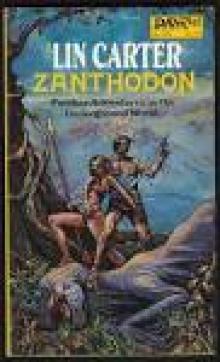 Zanthodon
Zanthodon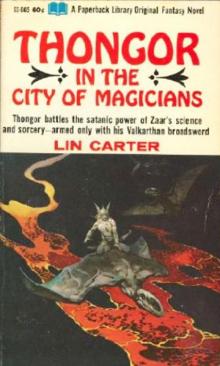 Thongor in the City of Magicians
Thongor in the City of Magicians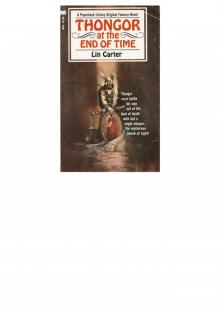 Thongor at the End of Time
Thongor at the End of Time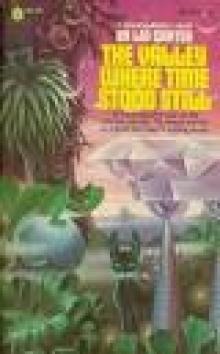 The Valley Where Time Stood Still
The Valley Where Time Stood Still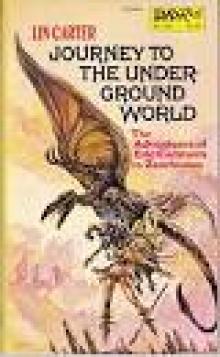 Journey To The Underground World
Journey To The Underground World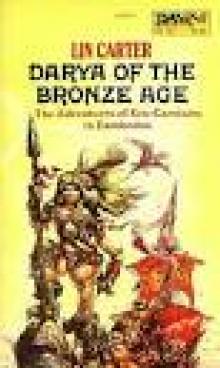 Darya of The Bronze Age
Darya of The Bronze Age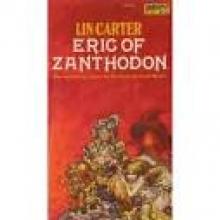 Eric of Zanthodon
Eric of Zanthodon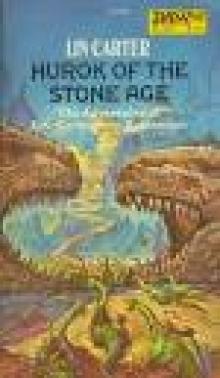 Hurok Of The Stone Age
Hurok Of The Stone Age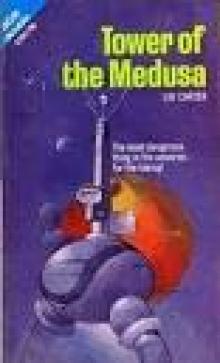 Tower Of The Medusa
Tower Of The Medusa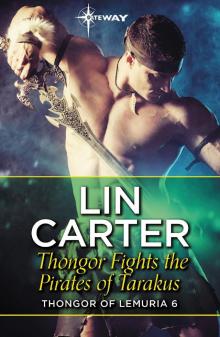 Thongor Fights the Pirates of Tarakus
Thongor Fights the Pirates of Tarakus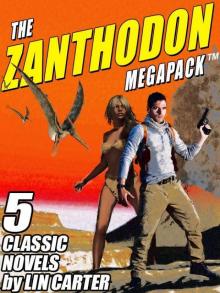 The Zanthodon MEGAPACK ™: The Complete 5-Book Series
The Zanthodon MEGAPACK ™: The Complete 5-Book Series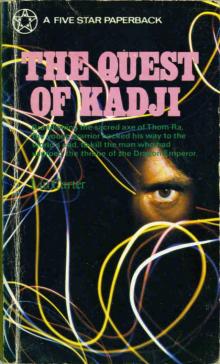 The Quest of Kadji
The Quest of Kadji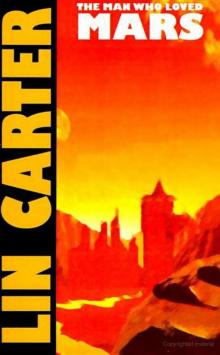 Lin Carter - The Man Who Loved Mars
Lin Carter - The Man Who Loved Mars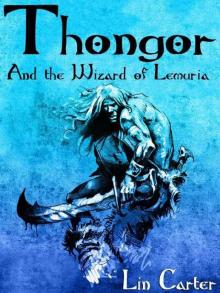 Thongor and the Wizard of Lemuria
Thongor and the Wizard of Lemuria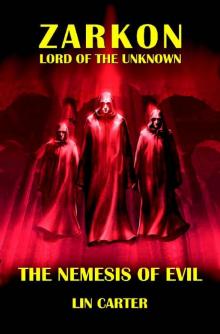 The Nemesis of Evil
The Nemesis of Evil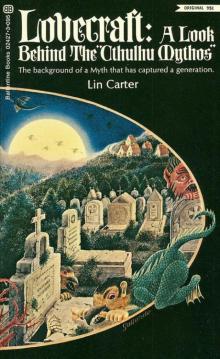 H.P.Lovecraft: A Look Behind Cthulhu Mythos
H.P.Lovecraft: A Look Behind Cthulhu Mythos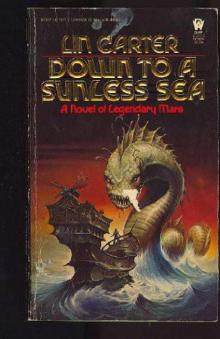 Lin Carter - Down to a Sunless Sea
Lin Carter - Down to a Sunless Sea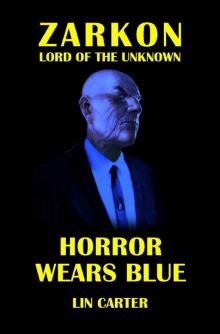 Horror Wears Blue
Horror Wears Blue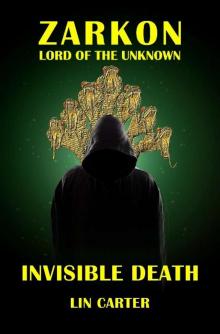 Invisible Death
Invisible Death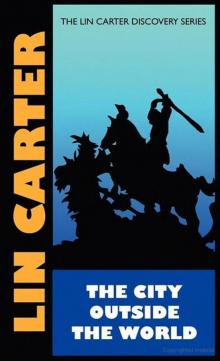 Lin Carter - The City Outside the World
Lin Carter - The City Outside the World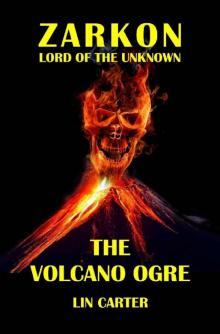 The Volcano Ogre
The Volcano Ogre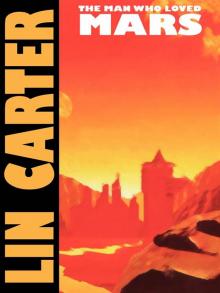 The Man Who Loved Mars
The Man Who Loved Mars